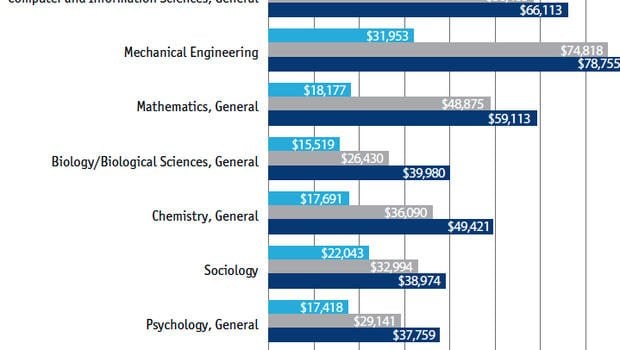Is a STEM degree a good investment?

Find your perfect value college
A proud moment for the parents of any college student might be when he or she declares a major in a STEM (Science, Technology, Engineering, Math) field. Maybe more relief than pride, as most of us now know STEM majors will find the job market much easier than their Liberal Arts counterparts. It’s hard out there for English and History majors, and don’t even ask about Theater or Dance. But major in Biology, Computer Science, or Mathematics, and you’re guaranteed some kind of job, right?
Well, yes and no.
Featured Programs
The demand for STEM careers
It is projected that by 2020, according to the U.S. Bureau of Labor Statistics (BLS), a 34% increase in professional, scientific, and technical services employment will take place. If the demand is there, it should result in higher wages. That’s how supply and demand work on the job market.
STEM jobs make a difference in our society no doubt, be it medical advances, energy conservation efforts or practical solutions to mechanical engineering. We’re living in the time of greatest expansion in STEM since the Cold War when the US and the Soviet Union both actively encouraged students to go into these fields to expand the military-industrial complex. Today, with globalization, there’s a new drive to create advances in technology, medicine, transportation, food production, and infrastructure.
The major research universities have known this for years, but even smaller liberal arts colleges are beginning to realize that if they want students who will graduate to jobs, pay back their student loans, and give donations as successful alumni, they need to build up their STEM programs.
Not all STEM is created equal
STEM is a hot topic amongst education experts, policymakers, and business leaders. We are seeing more recently, though, that the advantage to employment is more about the TEM, as Science has been facing a labor crunch, especially for recent graduates. A study by College Measures, a non-profit firm that helps governments gather and disperse salary data on new college graduates, showed that not all students who major in the sciences are cashing out.
There are reasons for this, among them being the fact that science majors usually find themselves going into education (which is saturated with job-seekers) or low-level lab positions without a graduate degree. Technology is paying more because there’s a shortage of qualified programmers, designers, and managers, and the field is expanding so rapidly; Engineering and Mathematics, because of their level of difficulty, have similar shortages.
The safe bet? Stick with TEM; think twice about the sciences. Give the same amount of consideration to Science you would give to English. What, really?! Yes; according to College Measures, graduates with degrees in the sciences earned no higher than those with an English Literature major. The College Measures data below was conducted in Texas, Colorado and Virginia and used first-year salary information provided by the participating state employment databases.
image courtesy of collegemeasures.org
Final words
Obviously, consider your interests first; if you don’t like the STEM majors, you won’t be happy, and students who are not happy are more likely to switch majors, losing time and money, or to drop out altogether. Think about your strengths as well; most prospective employers won’t look at your GPA, but if you plan on going for a graduate degree, graduate schools will. If STEM isn’t your strong point, you’re not going to go any farther with barely-passing grades on your transcript.
Choose a major that suits you. If it’s in STEM, congratulations, you’re a little closer to a stable career. But if it’s not, don’t try to force a round peg into a square hole. There’s a place for you somewhere.
Related Rankings:
- Best Value Online Colleges
- Lowest Out-of-State Tuition Colleges
- Best Value Community Colleges
- Best Value Online Graduate Schools
- Essential Guide to Online education in the USA
Featured Programs
Aya Andrews
Editor-in-Chief
Aya Andrews is a passionate educator and mother of two, with a diverse background that has shaped her approach to teaching and learning. Born in Metro Manila, she now calls San Diego home and is proud to be a Filipino-American. Aya earned her Masters degree in Education from San Diego State University, where she focused on developing innovative teaching methods to engage and inspire students.
Prior to her work in education, Aya spent several years as a continuing education consultant for KPMG, where she honed her skills in project management and client relations. She brings this same level of professionalism and expertise to her work as an educator, where she is committed to helping each of her students achieve their full potential.
In addition to her work as an educator, Aya is a devoted mother who is passionate about creating a nurturing and supportive home environment for her children. She is an active member of her community, volunteering her time and resources to support local schools and organizations. Aya is also an avid traveler, and loves to explore new cultures and cuisines with her family.
With a deep commitment to education and a passion for helping others succeed, Aya is a true inspiration to those around her. Her dedication to her craft, her community, and her family is a testament to her unwavering commitment to excellence in all aspects of her life.

